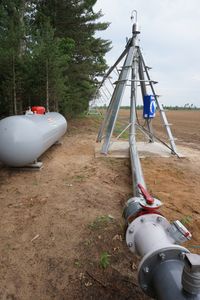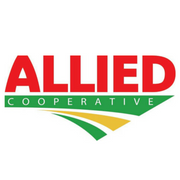Propane-Powered Irrigation Engines: Your Advantage in the Field

Across the United States, thousands of farmers enjoy the benefits of irrigating with propane-powered engines. In addition to outstanding performance, they know propane-powered irrigation engines are clean, reliable, and cost-effective, particularly when compared with diesel-fueled engines. It’s a decision that’s good for both your bottom line and the environment.
A Growing Trend
The use of propane-powered irrigation engines is on the rise. In 2013, 13,444 irrigation pumps on 6,204 farms used propane to irrigate 1.1 million acres. From 2008 to 2013, 25% more farms added these irrigation engines to their inventories.
Wagner Farms in Adams, WI, recently installed a propane-powered irrigation system on one of their newer leased fields. According to Harvey Wagner, the cost to install a three-phase electrical system at this location would have been nearly $30,000. The decision to install an efficient and clean propane system for their new location simply made more sense.
Performance You Can Count On
 Today’s EPA- and CARB-certified propane-powered engines have been designed and built from the ground up by leading engine manufacturers. They are engineered specifically to run on propane, so you get consistent power that’s available when and where you need it. And because propane is portable and operates on an independent system, you don’t have to worry about grid-related power interruptions or gas line fluctuations.
Today’s EPA- and CARB-certified propane-powered engines have been designed and built from the ground up by leading engine manufacturers. They are engineered specifically to run on propane, so you get consistent power that’s available when and where you need it. And because propane is portable and operates on an independent system, you don’t have to worry about grid-related power interruptions or gas line fluctuations.
Propane also stores exceptionally well, so there’s no need to drain tanks or stabilize your fuel from one season to the next. Plus, with the nature of the delivery and storage infrastructure, fuel theft is of little to no concern. Your propane provider will work with you to set up a fueling schedule that ensures your tank is always full.
Efficiency & Affordability
When you look at the benefits of propane, the cost advantages make it a smart business decision. New propane-powered engines typically cost 20-40% less than diesel engines with comparable power. When you factor in the Propane Farm Incentive Program or other available local incentives, the upfront costs are even less.
Once you start operating your propane-powered irrigation engine, the savings continue to add up. Most farmers save 40% or more compared with a diesel-fueled engine doing the same job. And compared with natural gas, a propane-powered engine provides 10% more horsepower per unit—that’s more power for your money.
The Latest Technology
Propane-powered irrigation engines utilize the latest technological advancements and features. These high-performing engines can provide up to 300 horsepower of continuous power. Beyond the engines themselves, remote monitoring and operating systems are also available to help producers better manage their operations.
For more information on how you can incorporate propane in your irrigation systems, visit Allied Cooperative in Adams, WI. This co-op was founded in 1918 and takes its commitment to its member-owners very seriously. You can check them out online or call their propane department at (608) 339-3394.
About the Business
Have a question? Ask the experts!
Send your question

